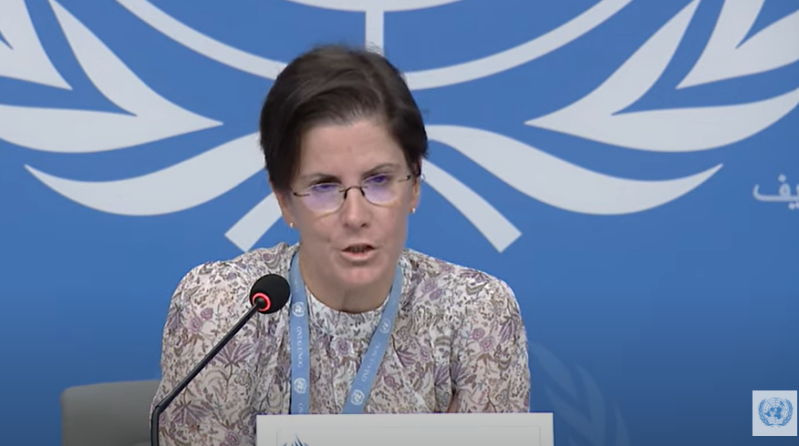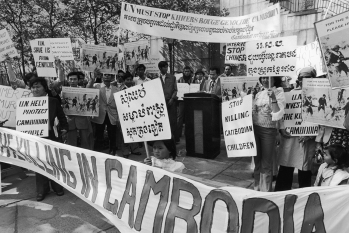
Following a United Nations rapporteur's report on the atrocities that accompany prostitution, evangelical groups call on nation states to stop normalizing sex services and instead officially recognise prostitution and its related variations as systematically linked to violence and the exploitation of women and girls.
The World Evangelical Alliance (WEA), the Evangelical Fellowship of Canada (EFC) and the Salvation Army International Social Justice Commission jointly presented their statement in a video submission as part of the U.N. Human Rights Council's 56th session in the Palais de Nations in Geneva, Switzerland, which is held from June 18 to July 12.
The organizations supported the gruesome and damning findings of Ms. Reem Alsalem, the U.N.'s Special Rapporteur on Violence Against Women And Girls, Its Causes And Consequences.
“Prostitution is a system of exploitation and an aggregated form of male violence against women and girls that intersects with other forms of structural discrimination,” said Alsalem in her report to the U.N. Human Rights Council, entitled, ‘Prostitution and Violence Against Women and Girls.’
“It is exercised systematically by a wide web of State and non-State actors that subjugate, control and exploit women and girls in violation of their fundamental human rights.
“The extreme levels of violence inflicted on women in prostitution – which would never be accepted in other contexts – are blanketed by a financial transaction, designed to materialize a so-called ‘consent’ that cannot be expressed freely in the prostitution system.
“In this context, the very concept of ‘consent’ is weaponized against women in prostitution, as it is extorted through physical or economic coercion, manipulation and violence.”
Alsalem listed multiple examples of disturbing forms of violence against women and girls, adding that “Globally, girls are the fastest growing group among detected trafficked persons.” She said girls were being trapped into prostitution “younger and younger, including some as young as 8 years of age.”
Pornography exposure for children had quadrupled sex offenses against children in the past decade, with most victims being girls. These acts of violence against women and girls, she said, constituted “torture, inhuman and degrading treatment.”
“Physical forms of violence – mainly by sex act buyers – include sexual abuse, rape and gang rape, severe beatings, including for the victim’s refusal, lack of enthusiasm or dissociation,” she wrote. Kidnapping, abduction and enforced disappearance were also common.
“Women and girls are mutilated or burned, including with cigarettes. They have foreign objects inserted into their bodies, urinated, defecated and ejaculated upon, and can be forced to have unprotected sex.
“In pornography, acts of gagging, brutal penetration of the vagina by one or several men, are particularly common. As a result, they are often left with lasting physical disabilities.
“Prostitution also leads to femicide, serial killings and death threats.”
Alsalem said women were often kept in slavery or “slavery-like conditions.” She even listed prostitutes being forced into sex acts with animals and the more brutal and violent sex acts meant sex users felt they received “their money’s worth.”
Frontline organizations reported that the consequences of prostitution on women and girls were akin to victims of torture. A study in nine countries showed that 68 percent of prostitutes suffered post traumatic stress.
Forced abortions, pelvic floor degradation and cervical cancer were among the numerous consequences of prostitution on women and girls noted in the report.
The issue of coercion was also highlighted, with control and exploitation not just by pimps and traffickers, but also States. Alsalem highlighted that migrant women in debt bondage were forced into sex acts to try and pay their debts.
Mothers can also lose custody of their children, many of whom are conceived from violent acts of prostitution, and the youngsters endure various developmental delays due to abuse, neglect, no education or father figure, language and learning disorders and the children are “also often stolen, drugged or sold in trafficking networks, regularly used for sexual abuse or rape, and often are killed too.”
This issue of State involvement meant that nations made profits from prostituted women in full legalized systems. Alsalem pointed out the example of Switzerland enjoying an annual revenue of 3.2 billion CHF (3.5 billion USD) generated by the commercial sex industry.
“States benefit from the prostitution of women through personal income tax imposed on them, the corporate taxing and licensing fees required on brothels and/or cyber enabled businesses, in essence becoming a ‘pimp State.’”
Authorities were also struggling to beat technological demands for prostitution via pornography. A study of popular porn videos in 2010 showed that 88.2 percent involved assault such as gagging, choking or strangulation.
In the Republic of Korea, where the U.S. Government estimated in 2022 that 44 percent espouse a religion and 45 percent of that figure are Protestant and 18 percent Roman Catholic, Alsalem said 42 percent of all men have bought sex acts once in their lifetime.
Alsalem said that driving instructors in the Netherlands can now demand a sex act from students for payment, known as “a ride for a ride.” In the U.K. the University of Leicester gave a ‘sex worker toolkit’ to students “while failing to develop any financial support dedicated to its most precarious female students.”
Evangelicals say normalizing of sex services must stop
The evangelical bodies support Alsalem’s call for an “abolitionist legal framework” to be adopted and to stop the normalizing of sex services, which often violates impoverished and vulnerable women.
Markus Hofer, WEA’s UN Communications and Advocacy Officer, said that prostitution is “intrinsically linked to violence” and is a form of violence in itself.
Hofer slammed the system of prostitution presenting women “as commodities.” He said that Alsalem’s report recognised “prostitution as a system of inequality and discrimination based on sex and other intersecting grounds.”
“As such, there is a full spectrum of international human rights standards that apply in the context of prostitution.
“We affirm the Special Rapporteur’s findings that prostitution is both intrinsically linked to violence against women and girls and constitutes a form of violence in and of itself.
“We are particularly concerned about the contexts that create vulnerability to exploitation in prostitution and appreciate the report’s fulsome discussion of those factors.”
The Evangelical Fellowship of Canada (EFC) welcomed the special rapporteur’s “groundbreaking” report on prostitution and violence against women and girls.
Julia Beazley, EFC director of public policy, told Christian Daily International that the faith body also welcomed the special rapporteur’s recognition that prostitution is a “system of exploitation and violence, which reduces women and girls to commodities.”
“Significantly, she found that prostitution is both intrinsically linked to different forms of violence against women and girls and constitutes a form of violence in and of itself,” said Beazley.
She highlighted that the EFC had responded with a written submission on the issue, following a call in January from the Special Rapporteur asking for input for her report.
“These findings align with the perspective we shared in our written submission, that ‘Prostitution is a system of exploitation that is based on structural and gender inequalities and preys on vulnerabilities’,” said Beazley.
“We have long argued that violence is inherent to prostitution, a finding affirmed by a recent Ontario Superior court decision, which found that ‘violence is a feature, not a bug of sex work.’”
Beazley knew of a “push” by some undisclosed groups to decriminalize prostitution in both Canada and around the world.
“But this report underlines the inherently exploitative nature of prostitution as a system of violence, and the importance of abolishing this system in order to protect the safety, dignity and equality of women and girls.”
The public policy director hoped that countries would heed the report and the presented evidence, and recommendations by the Special Rapporteur, and adopt the equality model approach to prostitution, which penalizes demands from buyers for paid sexual acts.
The EFC wants five “pillars” to be adopted by nation states. These are the decriminalization of women in prostitution; providing comprehensive support and exit pathways; criminalizing the purchase of sexual acts; criminalizing all forms of pimping; and implementing sensitization campaigns for sexual act buyers.
“We urge all countries to recognize prostitution with its connected variations, such as pornography, as a system of exploitation and violence,” said Beazley.
In a June 13 letter to the UN Office of the High Commissioner for Human Rights, the EFC’s Centre for Faith and Public Life, based in Ottawa, Canada, spoke of its advocacy work in persuading Canada’s Parliament to adopt the Protection of Communities and Exploited Persons Act.
This law criminalized a consumer buying and profting of sex services from another person, whilst “immunizing” prostituted persons from prosecution.
“We have long argued that prostitution is not merely a series of interactions between purchaser and purchased that exist independently of one another. Rather, prostitution is part of a system of exploitation that is based on structural inequalities and preys on a range of vulnerabilities. It is fundamentally contrary to equality between the sexes, and is both based in and relies on that inequality to exist,” the letter read.
According to World Population Review's estimates, there are 42 million prostitutes in the world with the following countries having legalized prostitution as of 2024: Australia, New Zealand, Indonesia, Mozambique, Turkey, Eritrea, Sierra Leone, Greece, Hungary, Germany, Switzerland, Uruguay, Bolivia, Peru, Ecuador, Colombia, and Venezuela.




